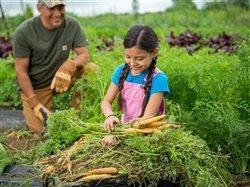
The edible backyard: A source for family meals – and fun
(BPT) – Have your kids ever asked you where the food they’re eating comes from? It’s a question many parents are answering right from their backyard and porches.
To create a hands-on educational experience, many families are transforming their usable spaces into fruit and vegetable gardens that feed the whole family, and sometimes neighbors, too. For the price of a few seeds or seedlings, you can produce fruits and vegetables that are delicious, safe, economical, nutritious, and fresh—and the best part is, your whole family can dig in together.
Truly, a lifetime of gardening for your children can start with a simple seed, and the benefits are not only health-giving but educational as well. According to a study conducted by Tractor Supply Company, the nation’s largest rural lifestyle retailer, 89 percent of Americans feel their children need a better understanding of where their food comes from.
“Four years ago, we moved from Los Angeles to a small, rural town outside of Ashville, N.C. with dreams of growing as much of our own food as possible,” said Beryl Frohriep of WildRootsHomestead.com, a homesteader and Tractor Supply Company contributor who relies on homegrown food for her family of four’s plant-based diet. “By growing what we eat, we know what goes into the soil and what comes out of it; our food is fresh, delicious, safe and nutritionally rich. These days, it is my 5-year-old son doing much of the harvest, and I love that we get to learn and grow as a family by working together outdoors.”
If you’re interested in starting your own backyard garden, here are a few tips from the experts at Tractor Supply Company:
How do I start?
The first thing to do is decide where your garden will go. Choose an area with the most southern facing sun exposure. Next, get a soil test kit at your local Tractor Supply store. If you’re going to invest time, work and money into your garden, you should make sure your soil is fertile. This simple, inexpensive test will determine that.
What should I grow?
Simply put, plant the vegetables that your family likes. If your family eats a lot of salad, think about planting lettuces, cucumber, carrots, broccoli, cauliflower, radishes and, of course, tomatoes.
It’s also smart to think about the types of meals you cook. Do you stir-fry? Grow bell peppers, onions, peas, and broccoli. Do you enjoy Mexican food? Consider various hot peppers and cilantro. Do you create main dishes from vegetables? Then potatoes, squash, eggplant and spinach might be the way to go.
When planning your garden’s vegetables, consider adding some that your household considers tolerable, but not great. You may find that homegrown freshness increases the taste, and that vegetable just might turn into a family favorite.
Plant an unfamiliar vegetable or two, just for kicks. If it’s not to your liking, give the harvest to neighbors or your local food bank.
How large should my garden be?
A great size for a beginner’s garden is 10×18 feet, which can easily feed a family of four to six. However, your garden should reflect the size of your family, availability of space, amount of time you can spend tending to it and the amount of work you’re willing to do.
It’s important to remember that too large a garden can easily overwhelm you and become a discouraging chore instead of an enjoyable pastime. Keep it manageable. You’ll be amazed at the amount of delicious food you can grow in any space—even on a patio or balcony. No space is too small!
Supporting the culture
To help families spend more time together and maximize their garden yield, Tractor Supply Company carries all the supplies a family needs to grow a garden, including mulch, live plants, regular and organic seeds, and garden tools. The rural lifestyle store hosts gardening events featuring expert advice, special products and seed stations for children throughout the planting season. Check with your local Tractor Supply store for details on upcoming gardening events.
For more expert advice on lawn and garden care, visit Tractor Supply’s Know How Central, and for homegrown inspiration for your garden, visit Tractor Supply’s Pinterest page.


